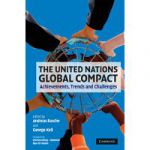The United Nations Global Compact: Retrospect and Prospect

Edited by
Andreas Rasche and Sandra Waddock and Malcolm McIntosh
Cambridge University Press,
2009
ISBN-13: 9780521145534
The special value of the Global Compact at its inception was its engagement with major actors, its Principles, its association with the United Nations and its commitment to operate through dialogue. It engaged business with the United Nations. Its principles were rooted in universal and legitimate international standards. And it was to be ‘driven’ by dialogue. It was, in particular, that aspect of the Global Compact that resulted in the decision of the international trade union movement to participate.
This chapter will explore the rationale for the original trade union involvement in the initiative. It will also examine the risk, present from the beginning, that the Compact could be derailed and lose its direction and become a ‘super-Corporate Social Responsibility (CSR)’ initiative, a sort of ‘feel-good’ drug for large companies. Most importantly, it looks at the potential which the Global Compact still has to add balance to globalization. The 2008 economic crisis is the culmination of decades of mistaken policies and actions. The Global Compact, like financial and economic decision-making, needs to be examined critically if we are not to exit the crisis with ‘business as usual’. The involvement of private parties in dialogue remains an essential component for a sound and prosperous economy, for respect for rights, for social justice and for a healthy environment. The Global Compact must renew its original promise if it is to contribute to the fundamental changes that must be made if we are to shift direction and move more towards sustainable development.
Andreas Rasche is Professor at the Center for Corporate Social Responsibility, Copenhagen Business School.
Georg Kell, Executive Director UNGC.
Sandra Waddock
Malcolm McIntosh
Among others
Introduction: the United Nations Global Compact – retrospect and prospect
Part I - Achievements, trends and challenges: reflections on the Principles
- Making sense of the United Nations Global Compact human rights principles
- The promise of the United Nations Global Compact: a trade union perspective on the labour principles
- The United Nations Global Compact Environmental Principles: achievements, trends and challenges
- ‘Caring for Climate’: the Business Leadership Platform
- Anti-corruption: challenges and trends
Part II - Participants and engagement mechanisms
- Academic institutions and the United Nations Global Compact: the Principles for Responsible
- NGOs and the United Nations Global Compact: the link between civil society and corporations
- Financial markets and the United Nations Global Compact: the Principles for Responsible Investment
- Learning from the Roundtables on the Sustainable Enterprise Economy: the United Nations Global Compact and the next ten years
- The United Nations Global Compact as a learning approach
Part III - Governance and Communication on Progress
- The United Nations Global Compact's governance framework and integrity measures
- The United Nations Global Compact Communication on Progress policy: origins, trends and challenges
- COP reporting in action: the case of Petrobras
- The United Nations Global Compact and the Global Reporting Initiative
Part IV - Local Networks: the emerging global–local link
- Building the United Nations Global Compact Local Network model: history and highlights
- The United Nations Global Compact as a Network of Networks
- Running a Global Compact Local Network: insights from the experience in Germany
- Building corporate citizenship through the United Nations Global Compact: contributions and lessons learned from the Argentinean Local Network
- Concluding remarks: from alleviating the negative impacts of globalization to transforming markets
About Us // Privacy Policy // Copyright Information // Legal Disclaimer // Contact
Copyright © 2012-2018 macondo publishing GmbH. All rights reserved.
The CSR Academy is an independent learning platform of the macondo publishing group.







